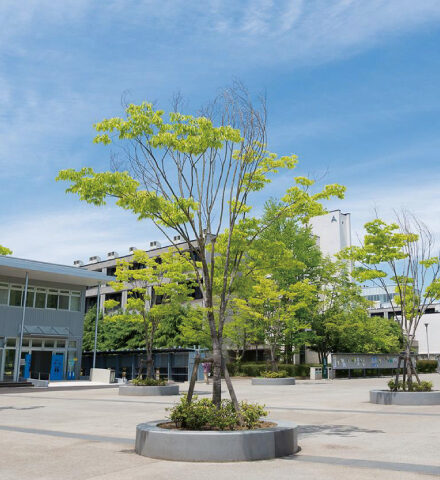Goals and Principles

1. Mission Statement of the Graduate School of International Cultural Studies (GSICS)
2. Diploma Policy
3. Curriculum Policy
4. Admission Policy
5. Defining Principles
1. Mission Statement of the Graduate School of International Cultural Studies (GSICS)
The Tohoku University Graduate School of International Cultural Studies (GSICS) was established in April 1993 as part of a major university-wide reform. In the process, GSICS became one of the university’s first independent graduate schools. The goal of GSICS is to provide fundamental and interdisciplinary education as well as conduct cutting-edge research on issues of international importance such as regional cultures, cultural exchange and language sciences. In doing so, GSICS hopes to achieve a high degree of excellence amongst its faculty and students, enabling them to flourish both in and outside of Japan in ways that contribute to the advancement of knowledge globally, while assisting in the furtherance of internationalization.
The progress of large-scale human exchange beyond nations as evidenced, above all, by the internationalization of economic activities implicates two essential trends, one which is positive and one which is oftentimes negative. That is, while internationalization leads to the promotion of mutual understanding among the many nations of the world, at the same time, serious economic and cultural friction may occur between nations during the course of such exchange. These conflicts are due not only to differences in language and styles of thinking, but also, most often, the result of a lack of understanding of local history, culture, religion and views of nature. Once such differences arise, the resulting tensions are often difficult to offset and, unfortunately, to this day there appears to be no end to ethnic and regional conflicts caused by religious and cultural misunderstanding and intolerance.
While the world of the 21st century has become increasingly globalized and borderless, in order for Japan to build a high quality network of exchange and cooperation with its international neighbors, it is of the utmost importance to train researchers and professionals who possess not only highly specialized knowledge in their fields but also a deep appreciation of the problems and implications associated with international exchange. From this standpoint, GSICS offers educational training which strives to train creative researchers and professionals with a broad range of interdisciplinary knowledge and international perspectives.
Information has become a major element of international exchange in the global age, with numerous nations moving toward cultural and economic cooperation. Under such conditions, many local and regional cultures with diverse historical backgrounds have begun to influence and merge with each other, forging a new set of shared values and traditions that could be referred to as ‘international culture’. The mission of our faculty and students at GSICS is to engage in the study of this new international culture through examining the formation and development of each regional culture as well as exchanges between such cultures in both the past and present day.
As many have noted, the definition of culture is highly amorphous, embracing history, society, views of nature, science, technology, economic activity, education and lifestyle, as well as language, religion, philosophy, literature and the arts. Because culture is such a complex concept, GSICS approaches the subject of culture not as a single definable phenomenon, but rather a culmination of all of the above human activities. That is, at GSICS we strive to capture and understand what culture is by investigating how problems in the various disciplines influence the way of life and patterns of behavior of people around the world. In so doing, we also strive to explain how such problems account for cultural diversity and uniqueness and, at the same, similarity and universality. Research on international culture is multi-layered and complex. For this reason, it requires new ways of thinking and academic approaches which move beyond the traditional frameworks, methods and concepts of the traditional, compartmentalized fields that have so long dominated the liberal arts and social and natural sciences.
Research on individual world cultures is but the initial stage of intellectual development for those studying at GSICS. At our graduate school, we aim to establish a new academic discipline of international cultural studies that is capable of interacting with an ever-changing environment of cultural exchange. We seek to do so with precision and open-mindedness, by adopting a theoretical framework that is scientifically sound, yet, at the same time, capable of dealing with the wide range of practical issues encountered in everyday life through the spread of international culture. Behind our effort is the hope that by training well rounded individuals with an international mindset, we can work together to tackle environmental and resource-related issues, moving toward sustainable world peace which ensures the coexistence of diverse social groups and a mutual understanding between different cultures. As the world as a whole moves forward deeper into the 21st century, the heart of our endeavor lies in the amicable resolution of tensions between regional and local cultures as well as peoples of diverse linguistic, social and religious backgrounds.
2. Diploma Policy
The two-year Master’s program
The Graduate School of International Cultural Studies, Tohoku University confers a master’s degree to students who have achieved the following goals:
(1) Possessing the ability to pursue original research in a specialized field or a high-skilled profession based on specialized knowledge/skills as well as a multidisciplinary perspective gained through an education integrating arts and sciences
(2) Acquiring the ability to make academic contributions to a wide range of needs in both academia and society while possessing a highly ethical and responsible outlook that contributes to society as a whole
(3) Exhibiting an international perspective, possessing communication skills required for presenting and understanding world-class research, acquiring the ability to contribute to academic advancement, and contributing to high-skilled professions based on practical problem-solving abilities
The three-year doctoral program
The Graduate School of International and Cultural Studies, Tohoku University confers a doctoral degree to students who have achieved the following goals:
(1) Possessing the capability to pursue and conduct independent and original research in a specialized field or possessing outstanding abilities to pursue a high-skills profession based on quality scholarship and advanced specialized knowledge/skills
(2) Acquiring the ability to make academic contributions to a wide range of needs in both academia and society while possessing a highly ethical and responsible outlook that contributes to society as a whole
(3) Having an exceptional international perspective and communication skills required for presenting and understanding world-class research results that shape research in one’s respective field nationally and globally, or assuming a leadership role in one’s respective profession
3. Curriculum Policy
The two-year Master’s program
The Graduate School of International Cultural Studies, Tohoku University offers multidisciplinary and specialized subjects, provides a supervised research system to support thesis writing, and promotes the acquisition of both general and specialist knowledge/skills related to major fields.
The Graduate School of International Cultural Studies structures and implements its educational curricula as follows to ensure that students meet the goals described in the Diploma Policy:
(1) A teaching system consisting of three components: (a) individual instruction in accordance with each student’s research topic; (b) group instruction through classroom activities; and (c) instruction by all faculty members in presentation sessions held twice a year. The course design is implemented to promote the degree conferment program.
(2) Offering two specialized courses for research ethics in Japanese and English to develop high ethical standards required to pursue research and to provide opportunities for a range of social experiences both on and off campus.
(3) In order to conduct research in English or Japanese, offering specialized courses in English for Japanese students and in Japanese for international students to enhance language skills
(4) To advance linguistic research and education, offering the English course International Graduate Program in Language Sciences. The Graduate Program in Global Governance and Sustainable Development is also provided in English to promote solutions to global political, environmental and developmental issues.
(5) To improve the quality of instruction, giving class evaluation surveys to students at the end of every semester
(6) To raise the quality of education, providing clear evaluation criteria for academic achievement and detailed reviews of students’ master thesis research and examination results. The examination and evaluation of research achievements will be conducted based on the predefined “Criteria for evaluation of dissertation of the Graduate School of International Cultural Studies, Tohoku University”.
The three-year doctoral program
The Graduate School of International Cultural Studies, Tohoku University structures and implements its educational curricula as follows to ensure that students meet the goals described in the Diploma Policy:
(1) Based on the degree conferment program, providing a supervised research system to support dissertation writing and promote the acquisition of both ample scholarship and advanced specialized knowledge/skills related to students’ research fields
(2) Developing high ethical standards and leadership required to pursue world-class research and providing opportunities for learning from the latest research both domestically and abroad
(3) Providing clear evaluation criteria for academic achievements according to Article 12 of the “Rules of the Graduate School of International Cultural Studies, Tohoku University”, and conducting detailed reviews of students’ doctoral thesis research and examination results. The examination and evaluation of research achievements will be conducted based on the predefined “Criteria for evaluation of dissertation of the Graduate School of International Cultural Studies, Tohoku University”.
4. Admission Policy
The Tohoku University Graduate School of International Cultural Studies provides students with the ability to think and analyze in an international and interdisciplinary manner, advanced foreign language skills, and a high level of specialized knowledge and clear awareness of issues in the following three areas: (1) diverse regional cultures of Japan and other areas seen from an international perspective, (2) global issues concerning the environment, resources, and sustainable society in which all humankind can coexist, and (3) language underlying international society. Our educational goal is to train professionals, teachers, and researchers who can play an active role on a global scale with their rich education, international perspective, and high ideal of contributing to the stewardship and development of human civilization and culture. To achieve this goal, we seek students who have clear aspirations of becoming creative researchers or professionals and are active in the international community, equipped with flexible thinking skills, broad academic knowledge, and advanced language skills.
In admitting students, we have entrance examinations in the following categories: general selection, special selection for international applicants applying from overseas, selection for those advancing to the doctoral program from our MA program (only for the three-year doctoral program), entrance examination for the Global Governance and Sustainable Development Program, and entrance examination for the International Graduate Program in Language Sciences. These are used to select applicants who have the advanced abilities and qualities needed to conduct research in line with the educational ideals/goals mentioned above.
The two-year Master’s program
In the category of general selection, applicants are evaluated based on (1) their scores in a written test to evaluate their knowledge about their specialized fields and (2) an interview and a review of their application materials, which are to assess their motivation, research plans, and foreign language skills needed for research, among other things. These are given roughly equal weight.
In the category of special selection for international applicants applying from overseas, applicants who are recommended by their home universities are evaluated based on (1) a review of their application materials and (2) an interview. We assess their specialized knowledge, their ability to think logically and express their ideas in writing, and their motivation and research plans. These are given roughly equal weight.
In the entrance examination for the Global Governance and Sustainable Development Program, applicants are evaluated based on (1) a review of their application materials and (2) an interview. We examine whether they have the high-level English proficiency needed to study in the program where English is the medium of instruction, the academic motivation and thinking ability to tackle today’s social issues, and the ability to set a practical problem to solve. These are given roughly equal weight.
In the entrance examination for the International Graduate Program in Language Sciences, applicants are evaluated based on (1) a review of their application materials and (2) an interview. We examine whether they have the high-level English proficiency needed to study in the program (as English is the medium of instruction), and the specialized knowledge and ability to think interdisciplinarily required in the field of language sciences. These are given roughly equal weight.
We expect students to possess basic knowledge in their areas of expertise, basic foreign language skills, and skills in writing logically, before their enrollment.
The three-year doctoral program
In the category of general selection, applicants are evaluated based on (1) their MA theses, (2) their scores in a written test to assess whether they have the advanced knowledge in their specialized fields, and (3) an interview and a review of their application materials, which are to assess their motivation, research plan, and foreign language skills needed for research at a higher level, among other things. These are given roughly equal weight.
In the category of special selection for international applicants applying from overseas, applicants who are recommended by their home universities are evaluated based on (1) a review of their application materials and (2) an interview. We assess whether they have advanced knowledge in their specialized areas. We also examine their ability to conduct research, motivation, and research plan. These are given roughly equal weight.
In the category of selection for those who wish to advance to the doctoral program from our MA program, we assess whether applicants have advanced knowledge in their specialized areas and high-level foreign language skills needed for research, based on (1) their MA theses and (2) a review of their application materials and an interview. These are given roughly equal weight.
In the entrance examination for the Global Governance and Sustainable Development Program, applicants are evaluated based on (1) a review of their application materials and (2) an interview. We examine whether they have the high-level English proficiency needed to study in the program (as English is the medium of instruction), the ability to think critically about today’s social issues, and the ability to solve practical problems. These are given roughly equal weight.
In the entrance examination for the International Graduate Program in Language Sciences, applicants are evaluated based on (1) a review of their application materials and (2) an interview. We examine whether they have the high-level English proficiency needed to study in the program (as English is the medium of instruction), the advanced specialized knowledge necessary in the field of language sciences, the practical ability to conduct research, and the ability to perform interdisciplinary analyses. These are given roughly equal weight.
We expect students to possess broad knowledge in their areas of expertise, advanced foreign language skills, and ability to conduct creative research, before their enrollment.
5. Defining Principles
A Focus on Creativity
GSICS trains scholars and professionals capable of forming innovative questions and providing unique and creative solutions to the many critical issues confronting humankind.
Global Competitiveness
GSICS strives to develop world-class scholars and professionals through an educational environment that emphasizes firsthand experience and the communication skills necessary to compete on the world stage.
Openness to the Local Community and the World
GSICS welcomes talented individuals not only from within Japan but from all around the world. We welcome students from all age groups and backgrounds including those who are returning to higher education after a hiatus in their studies, those who wish to pursue a degree while working full time, or even those who wish to join us while residing outside of Japan. We do our best to meet the specific needs of every incoming student.
GSICS Welcomes Challengers
GSICS seeks students with a wide range of educational and professional backgrounds. In addition to assisting students to progress in their current field, we also welcome students wishing to pursue a degree in a field for which they may not have had previous training in. We are always eager to offer guidance and support to those who wish to challenge themselves with something new.



